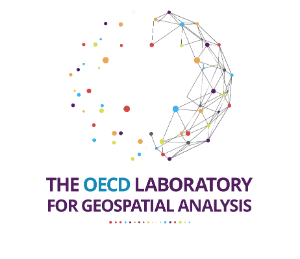Regional Statistics
The OECD Laboratory for Geospatial Analysis
The OECD Laboratory for Geospatial Analysis (aka Geospatial Lab) is a platform that proposes to connect people from different organisations, including academia, government agencies, the private sector, and Statistical Offices to develop and disseminate policy-relevant analyses based on geospatial information
Geospatial (i.e. location and geographic) data is pervasive and is recognised to bring new and significant insight in solving key challenges in all sectors and facets of society. The use of geospatial data and spatial analytical techniques has become paramount to responding to growing concerns for increasing geographical inequalities in many life domains and the heightened need for place-based policy-making |
|
|
The OECD Laboratory for Geospatial Analysis (The Geospatial Lab) is an initiative to encourage the widespread adoption of geospatial data in shaping policies that make a difference in tackling today’s place-based problems. It aims to create an international community of stakeholders from the public, private, and not-for-profit sectors, to share knowledge and co-operate in the production and use of geospatial data, all the while emphasising the policy implications of geospatial data use. The Lab is hosted by the OECD Centre for Entrepreneurship, SMEs, Regions and Cities (CFE). The Geospatial Lab cuts across institutions and scientific programs to create long-lasting policy and research networks that integrate geospatial information, statistical data and spatial modelling. The Lab aims to enhance harmonisation, test new approaches, as well as develop and disseminate policy relevant analyses using geospatial information |
|
|
Download the Terms of reference (Draft) |
|
Workstreams |
|
 |
1: Fostering transparency and reproducibility of open data pipelines - urban analytics This workstream will think, explore and propose standards for making open (geo-)data pipelines more transparent, accessible and reproducible. Transparency and reproducibility in geospatial pipelines is harder than on traditional ones because of the complexity of the technological stack required to process geospatial data (e.g. bringing together the worlds of databases, GIS, and data science). This working group will bring together different experiences, from the academic, policy and commercial world, on how open data pipelines are currently being developed; Identify emerging standard/best practices around the generation of transparent and reproducible open data pipelines; Propose recommendations for standards that organisations wanting to develop reliable open data products could adopt for their pipelines. |
 |
2: Promoting ethical and responsible use of geospatial data Location data is crucial to inform many policy decisions and to improve our quality of life. The ubiquity of location data will continue to grow as technological advancements continue to be made, and become increasingly available with our everyday use of smart devices for example. This naturally raises important ethical questions, and whilst many of which are relevant to all types of data, some remain unique to location data. This workstream will enable collaboration on location data ethics in the policy arena, and will propose a set of ethical standards and best practices on the responsible use of geospatial data and building public trust while simultaneously promoting its widespread use. It will also consider the impact, if any, of cultural relativism on location data ethics and how to mitigate the challenge of different countries having misaligned ethics guidelines. |
-100x100.png) |
3: The nexus of sustainability and economic development: utilising geospatial data to integrate environmental and economic planning There is an incredible need to both understand and balance the economic benefits and impacts of environmental decision making, as well as identifying the co-benefits that these initiatives can bring to local communities. Throughout this effort, there is an increased need for access to more robust data analysis tools that allow for multi-sector prioritization, standardized datasets that are relevant at the local scale, and training materials that help partners understand how to integrate environmental and economic planning. Within this workflow, we see numerous opportunities to help governments understand how environmental management interacts with and supports other priorities of economic development. The Center for Geospatial Solutions wants to help guide the development of replicable models that build strong local economies while simultaneously ensuring sustainable landscapes. We envision projects ranging from the most basic aspects of creating robust cadastral systems as a precursor to the ability to track land conservation efforts to more detailed analysis highlighting the potential economic benefits of effective land management such as sustainable resource development, tourism, carbon capture, or climate mitigation. |
 |
4: Reconciling mismatches between official statistics and earth observation data Data on global population distribution are an important strategic resource in high demand in the current age of new Development Agendas that call for universal inclusiveness of people. However, census data quality, detail, and timeliness varies significantly across countries. These shortcomings propagate to derived population grids and their applications. This workstream aims to supplement census data by detecting and mitigating major discrepancies in official data sources through data collected by remote sensing. The goal is to provide frameworks to utilise observational data collected through remote sensing techniques in the collection and calculation of census data, while also developing best practices that can be used across countries to encourage harmonisation of census statistics. |
 |
With the advance of technology, a wealth of data from the private sector is being made available for use in the policy realm, complimenting established datasets collected by traditional governments. One of the most important aspects of effective integration of public and private datasets are clear and reproducible data governance frameworks that not only streamline and demystify the integration process, but also consider the ethical and practical issues tied to the use of utilising private data for public use. Under the banner of ‘geo-information’, this workstream aims to collect geo-data from public and private data providers, and harmonize these datasets to generate statistical insights at the aggregated grid-level to be used for territorial monitoring purposes. Harmonising data on access and usage of social infrastructures such as parks and/or libraries could be an initial step, while in later phases such data could be merged with data on the activities and spatial distribution of local business and industries. The goal is to integrate data on different spatial amenities and commercial activity to provide a framework to monitor and diagnose the well-being and liveability of places at the grid level. |
Contact
Email address: geospatiallab@oecd.org
Related Documents
